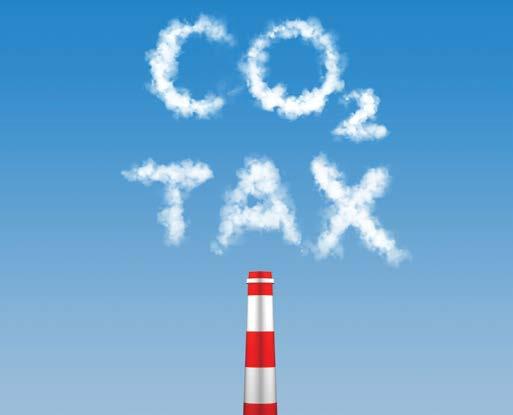
17 minute read
About WWF Pension fund portfolios and water risk
from Water Stewardship
by atleha-edu
PENSION FUND PORTFOLIOS AND CLIMATE RISK: INVESTING RESPONSIBLY TO MITIGATE CLIMATE RISK
In brief:
This article provides high-level guidance for retirement fund trustees and fund members as to the duties of South African pension fund boards in accounting for climate-related risks and opportunities when investing on behalf of their fund and its members.
Climate-change risk: Legal obligations of retirement and provident funds Regulation 28 of the Pension Funds Act, 1956 A recent legal opinion commissioned by ClientEarth and Just Share NPC, published in April 2019, found that boards of pension or provident funds (hereafter referred to as “boards”) are required by South African law to incorporate climate-related risks and opportunities into their investment decision-making processes when investing on behalf of their funds. Furthermore, the legal opinion also argued that failure to include material environmental, social and governance (ESG) risks, such as climate change, into investment decisions would likely result in a breach of fiduciary duty by the board, under both common law principles and Regulation 28 of the Pension Funds Act (PFA). Therefore, given the principles of Regulation 28, boards have a legal obligation to consider climate risk when making investments as it relates to pension fund investment portfolios. Regulation 28 under the PFA encourages the responsible investing of fund assets, grounded in a sustainable, long-term, risk-aligned and liability-driven investment philosophy. Moreover, regulation 28(2)(b) of the Act instructs that all funds need to have an investment policy statement and regulation 28(2)(c)(ix) indicates that the boards of funds should consider ESG factors before investing in an asset. A number of principles included in Regulation 28 set out the responsibilities and duties assigned to the fund and its board. A fundamental principle applicable to a board, or anyone to whom any investment-related powers and functions of a fund has been assigned (such as those of asset managers or asset consultants), is the following: 12
What experts say: “The value at risk to global manageable assets from climate change, in present value terms, is calculated at $4.2tr.” The Economist
“Before making an investment in and while invested in an asset, [the board must] consider any factor which may materially affect the sustainable long-term performance of the asset including, but not limited to, those of an environmental, social and governance character.” – Regulation 28 (2)(c)(ix)
Given that climate risk poses a material risk likely to have an impact on the long-term performance of an asset, it is clear that climate change risk must be considered in the investment decisionmaking process before an investment is made – as well as while the fund remains invested in an asset.
Actionable steps for South African pension fund boards
The following steps have been proposed in the legal opinion by ClientEarth and Just Share NPC to provide trustees with specific guidance in terms of recommended steps trustees should take to ensure they are in compliance with their fiduciary obligations:
The board needs to ensure that it has sufficient knowledge, sourced through expert advice, on climate change risk as it relates to the investments held by the fund. The board must have a good grasp of its fund’s portfolio carbon footprint through understanding which investments are at increased risk to climate change and what investment opportunities going forward can contribute to transitioning to a low-carbon economy. Boards need to ensure that a climate change policy is developed in order to ensure that climate change risks are identified and 1. managed accordingly. The climate change policy needs to be sufficiently communicated to service providers, such as fund managers appointed to responsibly manage the fund’s assets on behalf of the fund. Asset managers and consultants need to be given a clear mandate with regards implementing this policy. The board’s trustees need to promote active ownership through engaging with companies operating in carbon-intensive industries. The board’s investment policy needs to be developed in a manner that promotes accountability through the implementation of clear, measurable targets that work towards transitioning to a
REFERENCES:
low-carbon economy. 2.
Moneyweb 2017, King IV report as far as RI funds are concerned. Understanding South African Financial Markets (5th edition), Retirement Funds. Pages 165 -167.

CLIMATE RISK AND YOUR RETIREMENT FUND’S INVESTMENTS

In brief:
A case study of Standard Bank’s 2019 AGM and the shareholder resolution requiring Standard Bank to adopt and publicly disclose a policy on its lending to coal-fired power stations and coal mining operations.
In April 2019 two Standard Bank minority shareholders, the RAITH Foundation and the South African shareholder activist, Theo Botha, with support from Just Share NPC, tabled Standard Bank’s very first resolution on climate change risk. This was the first climate riskrelated shareholder resolution to be tabled in South Africa.
According to an article by Paul Verney, published in May 2019 on Responsible-Investor.com, the resolution was tabled by “shareholders holding less than 0.001% of the company’s issued ordinary share capital”. As reported by Just Share NPC in April, the resolution requested shareholder approval requiring Standard Bank to: (a) [Resolution 10.1] report to shareholders by the end of November 2019, at reasonable cost and omitting proprietary information, its assessment of the greenhouse gas emissions resulting from its financing portfolio and its exposure to climate change risk in its lending, investing and financing activities including: (i) the amount and percentage of carbon-related assets relative to total assets, and (ii) a description of any significant concentrations of credit exposure to carbon-related assets; and (b) [Resolution 10.2] adopt and publicly disclose a policy on lending to coal-fired power projects and coal mining activities. Resolution 10.2 received 55% support of the shareholder votes exercised, according to Verney and Just Share NPC, and therefore became binding on the company. This is the first time that a South African bank – or any listed South African company – has faced a shareholder resolution on a climate-related issue. Resolution 10.1, which received 38% support of the shareholder votes exercised, did not pass and thus did not become binding on Standard Bank. While Resolution 10.1 was not passed, it had received significant support, with 38% of shareholders voting in favour, indicating strong shareholder demand for improved climate risk-related disclosure from Standard Bank.
While Standard Bank had recommended that its shareholders should not vote in favour of the proposed resolutions, Standard Bank acknowledged the following:
Standard Bank acknowledged that it was well within the rights of its shareholders to table a resolution to be put to vote at the bank’s AGM; and Standard Bank was cognisant of the fact that, as a company operating in Africa, the bank was well aware of the climate risks and negative impacts of climate change on the continent. The issue was therefore one that required international attention, given its global nature which calls on all countries and stakeholders to play their part; and Institutional investors, such as pension and retirement funds through their investee companies, play a pivotal role in terms of proactively addressing matters such as greenhouse gas emissions through their lending and financing practices, as relayed in Standard Bank’s Shareholder information and notice
of annual general meeting
Standard Bank’s argument in motivating its shareholders not to support the proposed shareholder resolutions, was that:
The banking sector in particular was a heavily regulated industry, both locally and internationally, and was therefore considered to already have a number of reporting requirements that already addressed and reported on the bank’s lending exposures to the bank’s regulatory authorities.
Companies that have operations in South Africa are already required by law [as per the National Greenhouse Gas Emission
Reporting Regulation pursuant to the National Environmental
Management Act No. 39 of 2004 (Air Quality Act)] to report on their carbon emissions on an annual basis. Therefore, the bank was of the view that the most effective way of coordinating carbon reduction strategies was via already established international and national frameworks.
The methodologies required to measure carbon intensity across various portfolios are diverse, and therefore there was no standard methodological approach for such measurement, as shared in its Shareholder information and notice of annual general meeting.
Further to this, the bank was also of the view that it “currently has various measures in place to manage environmental, social and governance (ESG) risk in its lending practices, and the details of these measures were set out in the company’s ESG report,” as stated in its Shareholder information and notice of annual general meeting.
Post-AGM publication of Standard Bank’s Coal-Fired Power Finance Policy
On 31 July 2019, Standard Bank announced the release of its CoalFired Power Finance Policy. This requirement arose from the obligation imposed on Standard Bank by the 55% of shareholders who voted in favour of this shareholder resolution tabled at its AGM on 30 May 2019. Standard Bank confirmed that its new policy was aligned with the principles and standards for coal-fired power finance contained in the latest OECD Annex VI sector understanding on export credits for coal-fired electricity generation projects, dated January 2019.
The policy applies across the consolidated banking operations of the Standard Bank Group, excluding Liberty. Furthermore, the policy applies to direct finance of new coal-fired electricity generation plants without operational carbon capture and storage or carbon capture and utilisation technology. To be eligible for direct finance, coal-fired power plants must meet maximum emission and plant size parameters that are linked to the level of development of the country in which the coalpowered electricity generation plant is to be constructed.
In addition to the minimum eligibility requirements, direct finance of new coal-fired power generation in African economies requires enhanced due diligence, the specific details of which are provided in the policy. Lastly, all transactions considered under the policy are required to be reported to Standard Bank’s Head of Group Environmental & Social Risk and Finance for enhanced due diligence. Post-finance monitoring is also required on an ongoing basis.
Other South African banks and climate risk developments
Absa Bank:
Subsequent to the Standard Bank AGM in May 2019, Absa Bank at its own AGM on 4 June 2019 announced that it intends to start the process of allocating significant resources in coming to grips with climate change and the risks that climate change poses to Absa’s financing and lending portfolios, as reported by Warren Thompson for Business Day.
FirstRand Limited:
On 5 August, Just Share NPC and the RAITH Foundation submitted a climate risk resolution to FirstRand Limited. FirstRand’s AGM takes place on 28 November 2019 in Johannesburg. Similar to the Standard Bank resolution, the resolution calls for improved disclosure on FirstRand’s exposure to climate-related risks, and for it to adopt and publicly disclose a policy on lending to fossil fuel-related projects.
REFERENCES:
1. 2. Moneyweb 2017, King IV report as far as RI funds are concerned. Understanding South African Financial Markets (5th Edition),
Retirement Funds. Pages 165 -167. To learn more about this topic, hosted in partnership with the ASISA Academy, please visit Atleha-edu: www.atleha-edu.org or contact us on info@atleha-edu.org
WHY PENSION FUNDS MUST INVEST RESPONSIBLY FOR CLIMATE RESILIENCE

WHAT IS THE PROBLEM?
Climate change poses a systemic risk to people, the environment and the economy.
Temperature increases above 1.5°C have the potential to change life as we know it in South Africa completely.
The Paris Agreement on climate change recognises that there is an urgent need for a fast and just transition to a resilient low-carbon economy that will drive job creation, reduce inequality and build social stability.
But this will not happen without urgent collaborative action from all of us.
In South Africa, our law supports strong action by institutional investors like pension funds to tackle climate change and drive inclusive economic prosperity.
But pension funds have not yet risen to the challenge: they need to do much more, much faster. WHY ARE PENSION FUNDS IMPORTANT?
Pension funds are influential actors in our financial system. Their decisions have broad impacts on society, and they are bound by strict duties and responsibilities to consider the nature of those impacts.
Climate change may pose serious financial risks to pension investments in the short, medium and long term.
At the same time, the transition to a low-carbon economy presents significant investment opportunities that can help to mitigate the broader economic risks posed by climate change and boost pension funds’ long-term returns.
ClientEarth and Just Share NPC commissioned a legal opinion from Fasken, written by SA’s top pension lawyers, which makes it very clear that South African pension fund boards are legally required to consider climate risks in making investment decisions.
We’ve written to pension fund boards across SA setting out the findings of the legal opinion, as well as steps that pension funds must take now to make sure they are complying with their legal duties.
HOW DOES THIS AFFECT YOU?
The savings of millions of South Africans are invested in pension funds which must sustain them in retirement.
Pension fund boards who manage these savings are doing so on behalf of workers, communities and beneficiaries who all have an interest in ensuring:
WHAT MUST PENSION FUNDS DO?

At the very least, pension fund boards must:
Ensure that they are “climate competent”, i.e. take appropriate advice, analyse and fully understand the climate risks and opportunities in relation to their funds. Assess the carbon footprint of their fund’s portfolio, and identify investments which are vulnerable to climate risk and those which can contribute to a just transition to a low-carbon economy.
Develop a clear climate policy which explains the fund’s understanding of climate risk, and how the board identifies and manages it.
Pursue active stewardship and engagement with companies in high-carbon sectors, including by setting clear voting policies and engagement escalation timelines; and regularly disclose to members how they are managing climate risk. Communicate this policy to asset managers and consultants who manage the fund’s investments on its behalf, and make sure that they are appropriately mandated and incentivised to implement the policy.
Develop an investment strategy with clear, measurable targets to remove portfolio carbon risk and leverage low carbon opportunities.
See the full list of recommendations for pension fund boards, and download the legal opinion and letters to pension funds at www.justshare.org.za
INTRODUCTION TO SOUTH AFRICA’S CARBON TAX

In May 2019, President Cyril Ramaphosa signed into law the Carbon Tax Act, the latest in the South African government’s efforts to limit the impact of climate change. The aim of the tax is to incentivise companies to reduce carbon emissions as well as to shift consumer and investor behaviour towards supporting companies with lower carbon emissions.
There are many sources of carbon emissions, but the most common are those from fossil fuel combustion in transportation, heating, industry and electricity generation – roughly 1kg of carbon dioxide (CO 2 ) is emitted for every kilowatt hour (kWh) of electricity generated in South Africa.
South Africa ratified the United Nations Framework Convention on Climate Change (UNFCC)’s Paris Agreement in 2016 and South Africa’s new carbon tax is seen as a way in which the country can ensure that it meets its objectives under the Paris Agreement. The act is in favour of the “polluter-pays-principle” and incentivises particularly large South African carbon-emitting companies to take into account the negative The Paris Agreement seeks to:
1.
2.
3. Combat climate change globally by keeping the global temperature rise since pre-industrial levels to well below 2˚C above pre-industrial levels before the turn of the century and; Pursue efforts to limit the temperature increase even further to 1.5°C. Strengthen the ability of countries to deal with the impacts of climate change.
Each country that endorses the Paris Agreement must come forward with its best efforts to reduce carbon emissions through locally appropriate activities outlined in documents called Nationally Determined Contributions (NDCs). The newly introduced Carbon Tax is one activity mentioned in South Africa’s NDC.
externalities of their productive activities.
How the tax works
Private and public sector entities surpassing a certain threshold of emissions (specified in the National GHG Emissions Reporting Regulations) will be taxed. A carbon tax of R120 will be charged for every tonne of carbon emissions released by those entities that exceed certain thresholds. The tax will be rolled out in phases, with the first phase being from 1 June 2019 to 31 December 2022 and the second phase from 2023 to 2030. The first phase of the tax will cover Scope 1 emissions (direct emissions from owned or controlled sources) only from stationary sources in certain sectors. Most land-use and agriculture emissions are excluded, as are emissions from residential use and the waste sector. Transport emissions will be covered by a levy on the price of fuel. performance allowance for those entities that have an emissions intensity below a sector benchmark; and an additional allowance of 10% for trade-exposed sectors. A 5% carbon budget allowance
Why a carbon tax?
It is generally accepted by economists that a carbon tax is a costeffective and economically efficient means for reducing carbon emissions. A carbon tax allows the government to put a price on carbon emissions and to shift the cost of pollution from society to the companies that are producing it.
Investors, creditors and consumers will increasingly find lowcarbon-intensive products and companies more attractive because they are subject to less carbon tax. Some companies will most likely attempt to pass on the cost of the new carbon tax to their customers which will, in turn, likely cause customers to switch to buying from companies with low(er) carbon emissions because such products will be cheaper. Innovative companies that are able to reduce their carbon emissions will most likely outperform their less innovative peers over time.
The rest of the world is fast moving towards a low-carbon economy. Due to the high carbon intensity of South Africa’s economy, given our reliance on Eskom and coal-fired power stations, our high-carbon produced merchandise will look less attractive – both for investment and export purposes. In future, some countries may put trade barriers in place against products made in countries where little to no effort is made to reduce carbon emissions, implying a greater need for these kinds of interventions in South Africa.
Lastly, the short-term costs associated with the carbon tax will be trumped by the long-term costs of inaction. The impact of climate change, like the changing rainfall patterns that adversely affect the agricultural sector, is already causing some commodity prices to rise – regardless of the imposition of the carbon tax. By taxing and reducing carbon emissions now, the future cost of climate change on society can be reduced.
Emissions • Scope 1 emissions are those emissions that stem directly from REFERENCES: • • the activities of an organisation or are under their control. These usually include emissions from company vehicles or company facilities. Scope 2, or indirect emissions, stem from the electricity purchased and used by the organisation. These emissions arise when the energy is produced and is eventually used by the organisation. Scope 3 emissions are all other indirect emissions that stem from an organisation’s activities that come from sources they neither own nor control. These include emissions associated with business travel, procurement, and waste and water, for example. 1. 2. 3. 4. The Carbon Report. The proposed South African carbon tax. Available: http://www.thecarbonreport.co.za/the-proposedsouth-african-carbon-tax/. The Carbon Report. When will South Africa introduce Carbon tax? Available: http://www.thecarbonreport.co.za/carbon-tax/. South African Government. President Cyril Ramaphosa signs 2019 Carbon Tax Act into law. Available: https://www.gov.za/ speeches/publication-2019-carbon-tax-act-26-may-2019-0000. Compare your footprint. What is the difference between scope 1, 2 & 3 emissions? Available: https://compareyourfootprint.com/ difference-scope-1-2-3-emissions/. In addition to the tax, qualifying companies will be given a variety of https://unfccc.int/process-and-meetings/the-paris-agreement/ tax-free emissions allowances in this first phase. Among these is a the-paris-agreement. basic tax-free allowance of 60% for all activities; a 10% allowance 6. WWF. Everything you didn’t know you should ask about the for process and fugitive emissions (these are emissions that result carbon tax. Available: https://dtnac4dfluyw8.cloudfront.net/ from unintended releases of gas); a maximum 10% allowance for downloads/wwf_carbon_tax_qanda_final.pdf?24601/Everythingcompanies that use carbon offsets to reduce their tax liability; a 5% you-didnt-know-you-should-ask-about-the-carbon-tax. is granted to qualifying entities that participate in the voluntary first phase of the Department of Environment, Forestry, and Fisheries To learn more about this topic, hosted in partnership with the (DEFF) carbon budgets. ASISA Academy, please visit Atleha-edu: www.atleha-edu.org or contact us on info@atleha-edu.org
5. United Nations Climate Change. The Paris Agreement. Available: 19



